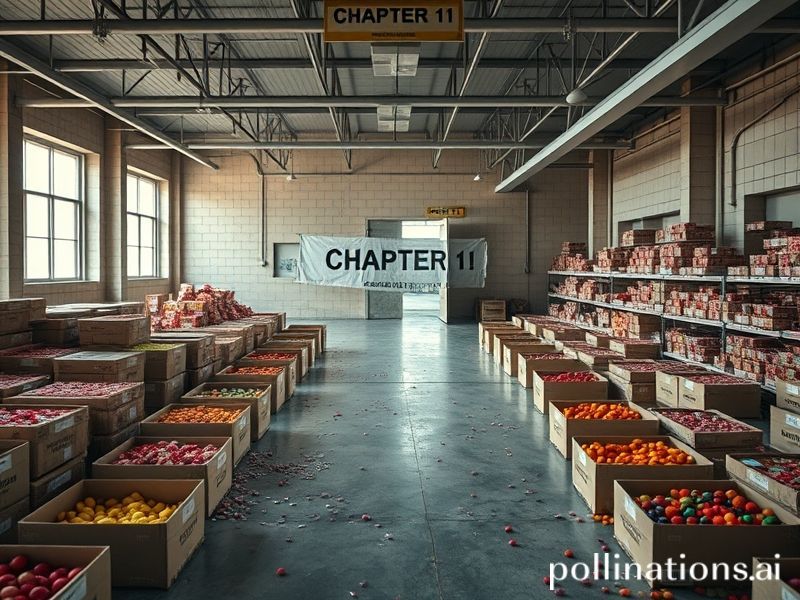Tootsie Roll Chapter 11: The Sweet, the Bitter, and the Chewy Economic Reality
**Sweet Dreams Are Made of… Bankruptcy? The Tootsie Roll Chapter 11 Drama That’s Got the World Hooked**
In a world where we’re all just trying to find our footing in the post-pandemic economic rollercoaster, even the sweetest treats aren’t immune to the bitter taste of financial woes. Enter Tootsie Roll Industries, the candy company that’s been a staple in our trick-or-treat bags and movie theater interludes since 1907, now filing for Chapter 11 bankruptcy. Yes, you read that right. The company that brought us the indestructible, ever-chewy Tootsie Roll is now facing its own tough-to-chew reality. But why is this trending globally, and what does it say about our collective sweet tooth and economic climate?
**The Cultural Context: A Nostalgic Bite**
Tootsie Rolls have been a cultural icon for over a century. They’ve been a part of our childhoods, our shared experiences, and even our slang (“Tootsie Roll” as a term for a certain body part, anyone?). They’ve been a go-to candy for soldiers during World War II, a favorite of President Reagan, and even a subject of a classic blues song. So, when a company like Tootsie Roll faces financial trouble, it’s not just about the bottom line—it’s about the nostalgia, the memories, and the collective childhood we’re all sharing.
**The Social Impact: A Sour Note in the Economic Recovery**
The Tootsie Roll Chapter 11 filing is more than just a blip on the radar of the confectionery world. It’s a sign of the times, a stark reminder that the economic recovery isn’t as sweet as we’d hoped. The company cited supply chain disruptions, rising costs, and labor shortages as reasons for its financial woes. Sound familiar? These are the same issues that have been plaguing businesses worldwide since the pandemic hit.
But here’s the twist: Tootsie Roll isn’t just any company. It’s a family-owned business, run by the third generation of the HR Ross family. This isn’t a faceless corporation; it’s a family business that’s been a part of our lives for generations. And now, it’s struggling to keep its doors open. It’s a stark reminder that no one is immune to the economic downturn, not even the companies that have been a part of our lives for over a century.
**The Significance: A Bittersweet Lesson**
The Tootsie Roll Chapter 11 drama is significant because it’s a microcosm of the larger economic issues we’re facing. It’s a reminder that the economic recovery is far from over, and that even the most beloved companies can struggle in the face of global disruptions.
But it’s also a reminder of the power of nostalgia and the importance of shared cultural experiences. Tootsie Rolls aren’t just candies; they’re a part of our collective history. And as Tootsie Roll Industries navigates its financial troubles, it’s a chance for us to reflect on the role these candies have played in our lives, and the role they’ll continue to play in the future.
So, as we watch the Tootsie Roll Chapter 11 drama unfold, let’s not just focus on the financial woes. Let’s remember the sweet memories, the shared experiences, and the indestructible spirit of the Tootsie Roll. After all, as the song goes, “Life is like a box of chocolates… or a Tootsie Roll, if you’re feeling chewy.”
**Conclusion: The Sweet and the Bitter**
The Tootsie Roll Chapter 11 filing is a bittersweet reminder of the economic realities we’re facing. It’s a stark reminder that no one is immune to the economic downturn, not even the companies that have been a part of our lives for generations. But it’s also a reminder of the power of nostalgia and the importance of shared cultural experiences. So, as we watch the Tootsie Roll drama unfold, let’s not just focus on the financial woes. Let’s remember the sweet memories, the shared experiences, and the indestructible spirit of the Tootsie Roll. After all, life is what you make it, and sometimes, that means making the best of a chewy situation.







